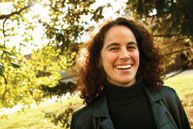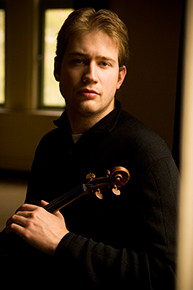New faces at McGill
McGill is on a decade-long hiring spree. To make up for the loss of professors in the lean nineties, the university goal is to hire 100 professors each year from 2000 until 2010. Each year, the Reporter picks eight new professors to profile, giving readers a glimpse into the breadth of scholarship within our community.
Ecologist is breath of fresh air

Elena Bennett is interested in ecosystem services and their management, urban ecology and adaptive management
Owen Egan
Epiphanies can be funny things because you're never quite sure when or where you're going to have one. Take Elena Bennett, a new professor in Natural Resource Sciences and the McGill School of Environment — she had hers in a class on lakes and society.
As a graduate student in Madison, Wisconsin, Bennett was thinking about doing her masters in environmental history. She signed up for the fateful class more because she was trying to track down a friend who might be in attendance than out of any burning desire to help the world. She left the class a changed woman.
"The professor, Steve Carpenter, gave the most amazing lecture I had ever heard," she remembers. "Right there I decided I was going into ecology." She hasn't looked back since.
Completing her masters, Bennett was contemplating some sort of environmental management work for her PhD when Carpenter, who had since become her advisor, convinced her instead to beef up her credentials by doing some hard science. Bennett decided on the ever-glamorous field of soil sampling. "While everyone else in my lab was canoeing out to the middle of the most beautiful lakes in Northern Wisconsin to take water samples, I was driving around suburban Madison digging holes in people's lawns," she says with a laugh.
Sexy? No, but immediately useful. Data from Bennett's dissertation played an integral role in the successful movement to ban the use of the phosphorus-based lawn fertilizers that were leaching into the water table and contaminating local lakes.
Bennett came to McGill after coming across an ad that, in her own words, "had the weirdest set of requests; terrestrial-aquatic linkage, expertise in soil and nutrients and some environmental stuff. I sat there thinking 'there's only one person in the world who does that particular set of random things — me!'"
At McGill, she plans to continue her research in managing ecosystem services, especially when there are tradeoffs. "Agriculture has some serious effects on our water," Bennett says. "To grow more food we use more fertilizer, and the nutrients from that fertilizer run off into the water and lowers its quality. It's a weird balance because most of the ways we get food impairs water quality and, in the end, we have to spend so much money to treat it to make it drinkable."
Bennett believes that one of the biggest mistakes officials make when managing ecosystems is that they focus on one or two aspects and not the whole system. She points to a situation in Quebec as a case in point.
"The provincial government came up with a law in which farmers had to balance their nutrient budget," she explains. "They had to figure out how much phosphorus they were taking off the land — like slaughtered pigs or harvested corn — and that's how much they could put back on. Basically, they could only replenish what they took off. Great plan, right? Except once farmers reached their limit, they started cutting down the forests on their land so they could boost their input again. Whenever you take an action, you have to take a step back and look at how it will affect the whole system."
Unlike the stereotype of the gloom-and-doom environmentalist prophesizing the inevitable apocalypse via melted polar ice caps or perforated ozone layer, Bennett is remarkably upbeat and enthusiastic. "People get overwhelmed by all the bad news," she says. "We need to show them the ways in which they can make a positive contribution to the environment. Everyone can do their part."
Her enthusiasm spills over when she talks about her new life here at McGill. "There are so many young, dynamic ecologists here at McGill — there's a buzz in the air," she smiles. "And my students are great, they are so bright and engaged. I'm happy to be able to teach them more than just a bunch of facts. Hey, this is a living, breathing science."
Music's plucky new recruit

Former Montreal Symphony Orchestra concertmaster Jonathan Crow returns to McGill's nest
Claudio Calligaris
Times are certainly changing for McGill's music scene. Inside and around the majestic nineteenth-century Strathcona Building, home to McGill's Schulich School of Music, signs of modernization abound — increased scholarship funding, the completion of the new music building, and the arrival of young new professors.
Jonathan Crow is among the latest additions to the faculty — and this talented musician is indeed a wise investment. Not yet out of his twenties, Crow is a far cry from the stereotypical image of either a concertmaster or a university professor. Still, at the tender age of 28, he is both.
Before graduating from his third and final year in McGill's undergraduate music program, Crow won an audition with the Montreal Symphony Orchestra (MSO) — an unusual feat for a not-yet-graduated undergrad, to say the least. Despite finally earning his degree with Honours and High Distinction in 1998 and having been concertmaster with McGill's Symphony Orchestra, Crow modestly attributes his success largely to luck. "It was a case of being in the right place at the right time," he says.
Perhaps Crow does not give himself enough credit. After joining the esteemed MSO as a second violinist, Crow moved up the ranks to become associate concertmaster and, ultimately, concertmaster. "It was very lucky for me," he states once again. Well, luck — and maybe even a little skill — has afforded him opportunities to perform around the world under such celebrated conductors as Charles Dutoit and Zubin Mehta, and alongside possibly the most well known violinist of all time, Yehudi Menuhin.
During his seven-year stay with the MSO, Crow was the youngest member of the orchestra. He now joins the Schulich School of Music as one of its youngest members. The job, he claims, is ideal for a musician, allowing him the delight of working with future top talent, the prestige of being associated with an acclaimed university, and the flexibility to travel and perform concerts and chamber music around the world.
Crow's performances currently take him across Canada and, every year in December, to Brazil. But the travel destinations are limitless: "I'll go wherever they'll call me," he says. "It's part of the job and it's expected that, as a professor, you're going to be doing a fair amount of performing elsewhere." It benefits the university by serving to advertise the music school and to recruit prospective students.
Crow insists that his departure from the MSO and its recent strike is purely coincidental. Plans for his departure from the orchestra and his arrival at McGill had already been set in motion long before the strike. He admits, however, that the strike did make his decision easier in retrospect. "It's always scary doing something new; however, it's less hard to leave a job where you're not working at the moment and have no idea when you will be."
Also helping to diminish Crow's apprehensions about starting a new career was the familiarity of his surroundings. "It wasn't like coming into a new job where everything is foreign." Crow knows almost everyone in the department and even performs with some of the faculty. "It's like coming home; like I never left," he says.
Still, Crow sees the changes that have happened since his student days. He notes that there is an emphasis now on electronics to prepare graduating students for the digital world that awaits them — a testament to the progressiveness of the music program.
Crow's youthful looks and his frequent references to hockey all serve as reminders that classical music doesn't belong only to an older generation. His favourite works? Beethoven's Violin Concerto and Duran Duran's A View to a Kill. And for all you future music students — it's Jonathan, not Professor Crow.

